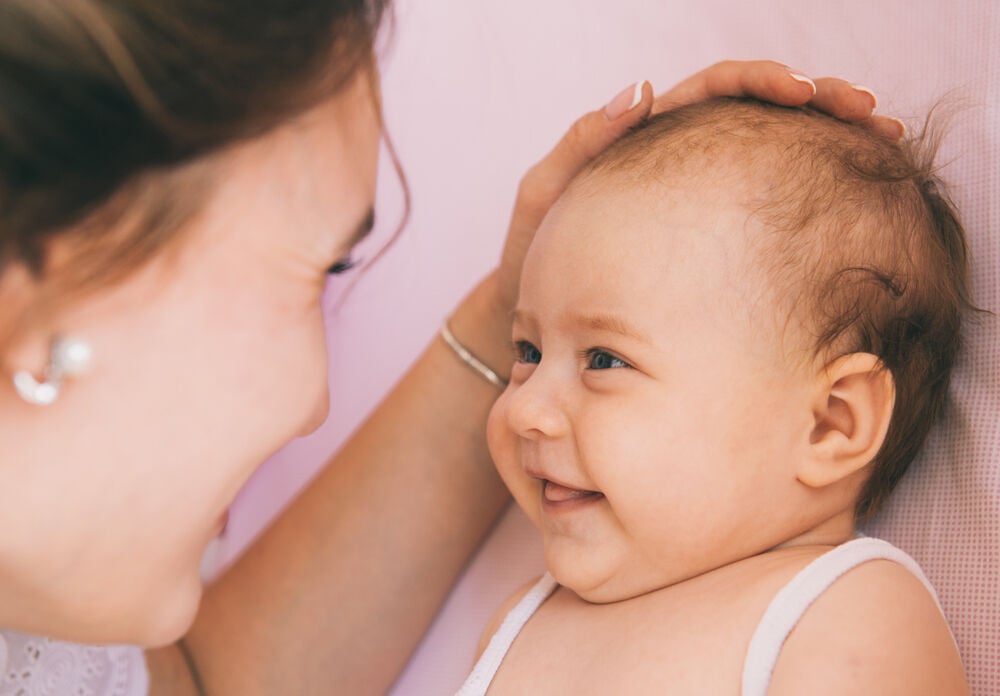-
Tracking cycle
-
Getting pregnant
-
Pregnancy
-
Help Center
-
Flo for Partners
-
Anonymous Mode
-
Flo app reviews
-
Flo Premium New
-
Secret Chats New
-
Symptom Checker New
-
Your cycle
-
Health 360°
-
Getting pregnant
-
Pregnancy
-
Being a mom
-
LGBTQ+
-
Quizzes
-
Ovulation calculator
-
hCG calculator
-
Pregnancy test calculator
-
Menstrual cycle calculator
-
Period calculator
-
Implantation calculator
-
Pregnancy weeks to months calculator
-
Pregnancy due date calculator
-
IVF and FET due date calculator
-
Due date calculator by ultrasound
-
Medical Affairs
-
Science & Research
-
Pass It On Project New
-
Privacy Portal
-
Press Center
-
Flo Accuracy
-
Careers
-
Contact Us
When Do Babies Smile for the First Time?


Every piece of content at Flo Health adheres to the highest editorial standards for language, style, and medical accuracy. To learn what we do to deliver the best health and lifestyle insights to you, check out our content review principles.
When do babies start smiling?
Between late night breastfeedings and sheer physical exhaustion, you could probably use a pick-me-up. Fortunately, at just 2 months, your baby’s already on the verge of developing a social smile that lights up a room.
Why is it such a big deal? Smiling tells you a lot about your infant’s developmental progress.
- It means their understanding of human behavior and interaction is improving.
- Once they learn how to smile, they’ll also quickly figure out how to use it to get your attention.
- It’s a strong indicator that their neurological development and communication skills are on track.
When can babies smile on purpose?
Believe it or not, babies can be seen making various facial expressions even while still in the womb.
You may have witnessed your newborn smiling in their sleep, but at this early stage, it’s most likely the result of passing gas! It might also happen when they’re sleepy, getting cozy, or peeing.
Between 6 and 8 weeks, your infant develops a more heartfelt, social smile. Chances are, your pediatrician will ask about it at their next checkup so be sure to keep an eye out.

Take a quiz
Find out what you can do with our Health Assistant
It’s the earliest lesson your child will learn about the importance of emotional connections and how their behavior affects others. So the simple act of smiling has a key impact on their self-esteem, not to mention their brain development.
At the 2-month-mark, smiling should be a regular occurrence. And there’s certainly no harm in encouraging them to do it as often as possible. Just take the following things into account:
- Timing:
A tired, hungry, or sick baby isn’t going to be in any mood for smiling. This isn’t the time to be playful with them. Tend to their immediate needs for rest, food, or TLC instead.
- Positioning:
They’re likelier to crack a smile when they’re ideally positioned and held face-to-face. A 2-month-old’s vision is at its best when you’re no more than a foot away. If you’re halfway across the room, don’t count on getting any kind of reaction.
- Greeting:
Your infant tends to respond very well to warm, enthusiastic greetings. An understated approach rarely does the trick. Raise your energy level when interacting with them, as well as a wide, open-mouthed smile and a cheerful, expressive tone.
Why your baby might not be smiling yet
There are a number of possible reasons your child isn’t up to smiling yet, and you really shouldn’t worry. If you still find yourself becoming anxious though, remember the following things:
- Your newborn won’t necessarily respond to your first attempts. Mutual smiling requires a little warming up, so if you’re feeling frustrated or disheartened, take a break and try again later.
- If they smile past you, without making direct eye contact, it’s not a cause for concern. When they’re very young, eye contact can be overstimulating and even overwhelming, so they’ll look at you askew instead. In time, they’ll be able to look you squarely in the eye.
- Babies born prematurely take longer to start smiling, and might require a few extra weeks to a month. However, once they’ve caught up, they’ll be grinning from ear to ear!
Your little one’s very first smile is something you’ll never forget. As they grow and develop, be sure to take every opportunity to interact and play with them. It can have an enormous impact on their future social skills and emotional well-being.


Hey, I'm Anique
I started using Flo app to track my period and ovulation because we wanted to have a baby.


The Flo app helped me learn about my body and spot ovulation signs during our conception journey.


I vividly
remember the day
that we switched
Flo into
Pregnancy Mode — it was
such a special
moment.
Real stories, real results
Learn how the Flo app became an amazing cheerleader for us on our conception journey.




